New Delhi – The Lok Sabha witnessed unprecedented chaos yesterday when Union Home Minister Amit Shah introduced the Constitution (130th Amendment) Bill, commonly referred to as the Jailed CM PM Bill. The legislation proposes that Prime Ministers, Chief Ministers, and ministers who remain in custody for more than 30 days on charges carrying sentences exceeding five years can be removed from office without conviction.
The Jailed CM PM Bill triggered violent protests in Parliament, with opposition members tearing up papers and throwing them at the Home Minister during the introduction. The dramatic scenes highlighted the deep political divide over legislation that the government claims will elevate moral standards while the opposition brands it as draconian and unconstitutional.
Constitutional Articles Under Amendment
The Jailed CM PM Bill seeks to amend three critical articles of the Constitution – Articles 75, 164, and 239AA. These amendments would establish a legal framework for removing high constitutional office holders based solely on allegations and custody duration, without requiring conviction in court.
The Jailed CM PM Bill specifically states that any minister, Chief Minister, or Prime Minister arrested and held in custody for over 30 days after being accused of offenses punishable by five years or more imprisonment shall be removed from office. Importantly, the legislation allows for reappointment after release, indicating that removal doesn’t constitute permanent disqualification.
Government’s Justification for Reform

The statement of objects and reasons accompanying the Jailed CM PM Bill emphasizes that elected representatives represent the hopes and aspirations of Indian citizens. The government argues that ministers holding office should maintain character and conduct beyond suspicion, with the legislation addressing constitutional gaps in handling arrested officials.
According to the Jailed CM PM Bill, ministers facing serious criminal allegations and detained in custody may undermine constitutional morality and good governance principles, ultimately diminishing public trust. The government maintains that no existing constitutional provision addresses the removal of ministers arrested and detained on serious criminal charges.
Opposition’s Fierce Resistance


Opposition parties have launched a comprehensive attack against the Jailed CM PM Bill, alleging it represents a systematic plan by the ruling BJP to misuse central agencies, frame non-BJP Chief Ministers, jail them, and destabilize state governments. Senior Congress leader Priyanka Gandhi Vadra described the legislation as “draconian,” claiming its presentation as an anti-corruption measure merely veils the government’s true intentions.
Trinamool Congress leader Abhishek Banerjee criticized the Jailed CM PM Bill, arguing that its intention is “to retain power, money and control over the nation, but without shouldering accountability.” Shiv Sena (UBT) representatives claimed the legislation aims to “end democracy and individual freedom” while leading the country toward dictatorship.
Strategic Timing and Political Calculations
The timing of the Jailed CM PM Bill introduction raises significant questions about the government’s strategic intentions. The Centre introduced this controversial legislation just one day before the Monsoon Session’s conclusion, with the bill listing indicating referral to a Joint Parliamentary Committee, suggesting no urgency for passage.
The Chair has decided to examine the Jailed CM PM Bill through a Joint Committee comprising 21 Lok Sabha members and 10 Rajya Sabha members across party lines. With the session ending, this examination process will extend considerably, allowing for prolonged political discourse around the legislation.
Mathematical Challenges in Parliament
The Jailed CM PM Bill faces insurmountable mathematical challenges in Parliament. Constitutional amendment bills require two-thirds majority in both Houses, but the NDA currently holds only 293 seats in the 542-member Lok Sabha, needing 361 votes for passage. Even with non-aligned party support, the government lacks sufficient numbers.
Similarly, in the Rajya Sabha, the Jailed CM PM Bill requires 160 votes from the 239-member House, while the NDA commands only 132 votes. The opposition’s unified stance against the legislation makes passage virtually impossible without cross-party support that appears unlikely given current political dynamics.
Perception Battle and Political Optics

Government sources suggest the Jailed CM PM Bill represents a calculated perception battle rather than immediate legislative intent. The administration aims to position opposition resistance as reluctance to support anti-corruption measures and cleaner politics initiatives, potentially damaging opposition credibility on governance issues.
The Jailed CM PM Bill controversy allows the government to deflect attention from other political challenges while forcing the opposition to defend positions that may appear sympathetic to corruption. This strategic positioning could benefit the ruling party in future electoral contests and public opinion formation.
Long-term Constitutional Implications
Beyond immediate political considerations, the Jailed CM PM Bill raises fundamental questions about constitutional principles, particularly the presumption of innocence until proven guilty. Legal experts anticipate Supreme Court challenges based on basic constitutional structure violations if the legislation advances through Parliament.
The Jailed CM PM Bill also affects federal structure relationships, requiring approval from at least half the states and Union Territories for implementation. However, with BJP governance in most states, this hurdle may prove less challenging than parliamentary passage requirements for this controversial constitutional amendment.

